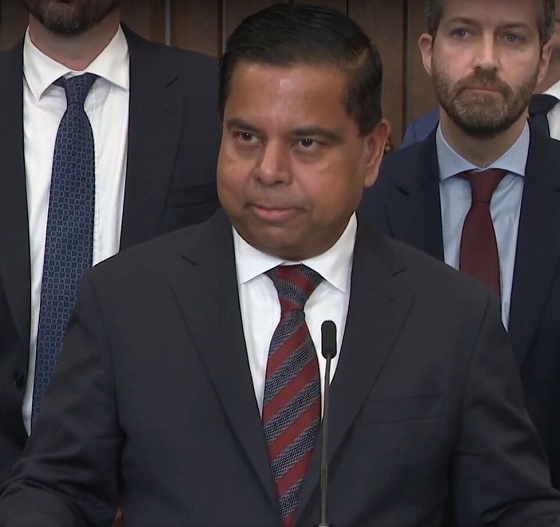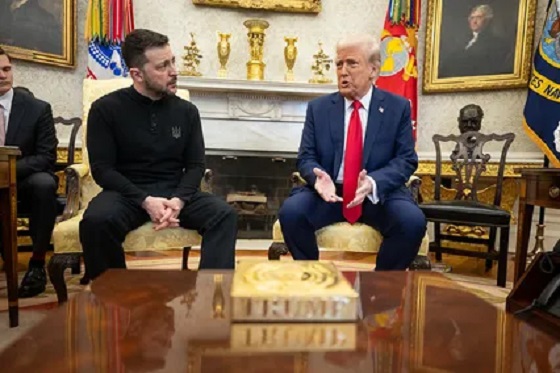International
‘Lot Of Nonsense’: Kari Lake Announces Voice Of America Is Dumping Legacy Outlets


From the Daily Caller News Foundation
By Hailey Gomez
Special Adviser for the U.S. Agency for Global Media (USAGM) Kari Lake announced Friday that Voice of America (VOA) will terminate its contracts with The Associated Press, Reuters, and Agence France-Presse.
VOA, an international broadcasting state media network, is funded by USAGM, with former President Joe Biden requesting in March 2024 a budget increase for the 2025 fiscal year to further support the radio network. In an X post on Friday, Lake announced USAGM will end its “expensive and unnecessary newswire contracts,” adding that some of the major agreements included “tens-of-millions of dollars in contracts” with AP News, Reuters and Agence France-Presse.
“USAGM is an American taxpayer funded News Organization with an 83-year history. We should not be paying outside news companies to tell us what the news is—with nearly a billion-dollar budget, we should be producing news ourselves,” Lake wrote. “And if that’s not possible, the American taxpayer should demand to know why.”
During a meeting with VOA staffers Friday, employees were reportedly told to “stop using wire service material for their reports,” according to Newsmax. Notably, audio, video, and text reports have often been used to supplement coverage from locations where reporters are not present, the outlet reported.
In an interview with Newsmax prior to the official contract cuts, Lake discussed how the agency was finding “a lot of nonsense that the American taxpayer shouldn’t be paying for.”
“Today, I started the process of terminating the agency’s contracts with the Associated Press, Reuters, & the Agence France-Presse. This will save taxpayers about 53 million dollars. The purpose of our agency is to tell the American story. We don’t need to outsource that responsibility to anyone else,” Lake wrote in an X post regarding the interview.
Disputes between The AP and the White House began in February after the corporate media outlet was revoked press access for refusing to call the Gulf of America by its new name. The AP filed a lawsuit on Feb. 21 against White House Press Secretary Karoline Leavitt, Chief of Staff Susie Wiles, and Deputy Chief of Staff Taylor Budowich for injunctive relief.
Lake was sworn in as USAGM’s special adviser on March 3, saying she’s “looking forward” to serving America and “streamlining” the agency. The cuts from the agency follow President Donald Trump’s push for his second administration to review the government’s wasteful spending.
conflict
Iran nuclear talks were ‘coordinated deception’ between US and Israel: report

From LifeSiteNews
Reports state that U.S. peace talks were a ruse and that Trump gave Netanyahu a ‘green light’ to hit Iran’s nuclear and military sites, killing top commanders.
A senior Israeli official told the Jerusalem Post that Tel Aviv and Washington worked together to convince Tehran that diplomacy was still possible after Israel was ready to attack Iran. Just hours before Israel’s massive assault began, President Donald Trump maintained he was still committed to talks.
The Israeli outlet reports, “The round of U.S.-Iranian nuclear negotiations scheduled for Sunday was part of a coordinated U.S.-Israeli deception aimed at lowering Iran’s guard ahead of Friday’s attack.”
READ: Israel strikes Iran’s nuclear sites, kills top commanders in massive air assault
In a post on Truth Social shortly before the Israeli strikes began, Trump declared that “We remain committed to a Diplomatic Resolution to the Iran Nuclear Issue! My entire Administration has been directed to negotiate with Iran. They could be a Great Country, but they first must completely give up hopes of obtaining a Nuclear Weapon. Thank you for your attention to this matter!”
After the Israeli attack was in progress, Secretary of State Marco Rubio denied that the U.S. was involved. However, American officials have said the White House was aware Israel was set to begin striking Iran, with Trump telling Fox News he was briefed on the operation.
Barak Ravid of Axios, moreover, later reported that Tel Aviv was given “a clear U.S. green light” to start bombing, citing two unnamed Israeli officials.
Sources speaking with Axios said the perceived split between Trump and Israeli Prime Minister Benjamin Netanyahu was coordinated behind the scenes. “Two Israeli officials claimed to Axios that Trump and his aides were only pretending to oppose an Israeli attack in public – and didn’t express opposition in private,” the report explained. “The goal, they say, was to convince Iran that no attack was imminent and make sure Iranians on Israel’s target list wouldn’t move to new locations.”
The sources said that Trump and Netanyahu discussed the attack during a phone call on Monday. After the call, reports said Trump pressed Netanyahu not to attack Iran, but that was another effort to deceive Iran.
In a second post following the attack, Trump said he gave Iran the opportunity to make a deal, and suggested that Israel used American weapons in the massive air raid. “I gave Iran chance after chance to make a deal. I told them, in the strongest of words, to ‘just do it,’ but no matter how hard they tried, no matter how close they got, they just couldn’t get it done,” the president wrote.
The post continued, “I told them it would be much worse than anything they know, anticipated, or were told, that the United States makes the best and most lethal military equipment anywhere in the World, BY FAR, and that Israel has a lot of it, with much more to come – And they know how to use it.”
The U.S. and Iran began negotiations on establishing a new nuclear agreement in April, with the two sides engaging in five rounds of Omani-mediated talks. At times, a deal appeared possible, with Iranian officials saying the dialogue was leading to progress. A sixth round of talks was scheduled for Sunday, but now appears unlikely.
A second source speaking with the Jerusalem Post said the goal of Israel’s military operations was not the complete destruction of Iran’s nuclear facilities, but rather to hit missile sites and top Iranian leaders to bring down the government.
Israel has conducted several rounds of strikes so far, hitting nuclear facilities, residential buildings in Tehran, and military sites. Iran has confirmed that several military leaders and nuclear scientists were killed in the bombing.
International
Israel’s Decapitation Strike on Iran Reverberates Across Global Flashpoints

 Sam Cooper
Sam Cooper
Vice President J.D. Vance predicted in 2024 that a war between Israel and Iran could spiral, complicating the Pentagon’s pivot to Taiwan defense
Israel launched a sweeping series of coordinated airstrikes early Friday morning against key Iranian nuclear and military assets, delivering what Israeli officials described as a preemptive blow to prevent the advancement of Iran’s nuclear weapons program.
The assault marked an explosive turning point in the long-running shadow conflict between the two states, potentially introducing worst-case scenarios of expanding regional conflict that could draw in global powers. This risk, which complicates Washington’s highest-level strategies of pivoting its military focus to counter the increasing risk of China invading Taiwan, was anticipated in a September 2024 interview with Vice President J.D. Vance, recorded shortly before the Trump administration’s surprising return to the White House.
The ongoing aerial, ground, and cyber assaults represent the first time Israel has successfully struck Iran’s nuclear enrichment facility at Natanz and assassinated multiple top Iranian security leaders in a single operation.
According to initial battlefield assessments and official statements, Israel’s campaign struck at least six military installations in and around Tehran, targeted missile bases and aerial defense systems, and penetrated deeply buried infrastructure at the Natanz uranium enrichment site. Iran confirmed that residential buildings and secure housing used by senior commanders were also hit. The operation was described by Western intelligence analysts as a long-prepared precision offensive combining cyber, signals intelligence, and advanced aerial munitions, including deep-penetration bombs.
The strikes killed at least three of Iran’s most senior security officials, including Maj. Gen. Mohammad Bagheri, Iran’s armed forces chief of staff and second only to the Supreme Leader in military command hierarchy. Gen. Amir Ali Hajizadeh, commander of the IRGC’s Aerospace Force and widely seen as the architect of Iran’s missile and drone doctrine, was also reported killed by Israeli officials with direct knowledge of the operation. Several senior nuclear scientists and other members of Iran’s strategic command structure were believed to be among the casualties, according to Israeli assessments and Iranian government-linked media outlets.
Israeli officials with knowledge of the operation reportedly indicated that a key element of the strike relied on real-time signals intelligence, including the tracking of encrypted communications and location pings from senior Iranian officials. In some areas, Mossad operatives were believed to be active on the ground, identifying targets and, in at least two instances, directing portable guided missile systems at convoy vehicles or secured compounds. These small, high-precision strike platforms—similar to man-portable air-delivered munitions—enabled Israeli forces to hit leadership figures with minimal collateral damage. The integration of live surveillance feeds, cyber disruption, and embedded human assets represented a new level of Israeli operational reach deep inside Iran’s urban and military zones.
Within hours, Iran launched approximately 100 drones in retaliation toward Israeli territory. Most were intercepted by Israeli air defenses, and damage assessments were ongoing as of Friday afternoon. The drone response, while immediate, was viewed by analysts as limited relative to the scope of the Israeli attack. Iran’s Supreme Leader Ayatollah Ali Khamenei vowed retaliation and ordered national security forces on heightened alert. Internally, Iran moved quickly to reassert military continuity, appointing Maj. Gen. Abdolrahim Mousavi as the new chief of staff of the armed forces, replacing Bagheri.
The broader regional and diplomatic implications began to unfold rapidly. In the days preceding the strike, the Trump administration had been engaged in indirect nuclear negotiations with Iran via intermediaries. President Trump publicly cautioned against a premature military strike, suggesting as recently as Thursday evening that such a move might derail diplomatic progress.
“Tonight, Israel took unilateral action against Iran. We are not involved in strikes against Iran and our top priority is protecting American forces in the region,” Secretary of State Marco Rubio said in a statement last night.
“Israel advised us that they believe this action was necessary for its self-defense. President Trump and the Administration have taken all necessary steps to protect our forces and remain in close contact with our regional partners. Let me be clear: Iran should not target U.S. interests or personnel,” Rubio said.
As of Friday morning, Trump had not issued a public statement, though reports confirmed his national security cabinet was preparing to meet in the White House Situation Room to assess the developments.
Global markets responded sharply to the escalating crisis. Oil prices jumped nearly eight percent on concerns of broader conflict across the Gulf, while gold surged to multi-month highs.
Israel’s stunning strike complicates the other two geopolitical flashpoints—surrounding Taiwan and Ukraine.
In September 2024, prior to the U.S. election, Trump’s running mate J.D. Vance had warned during a podcast interview that confrontation between Iran and Israel represented the most dangerous geopolitical flashpoint. He predicted that such a war could spiral into a region-wide conflict or potentially even a global one involving multiple powers.
“I think the most likely and most dangerous flashpoint right now is Iran and Israel,” Vance told former CIA operator Shaun Ryan, a popular podcaster in U.S. military and intelligence veteran communities.
“Obviously, the Israelis are on high alert. They just experienced a terrorist attack and are dealing with Hamas,” Vance said, while identifying a Chinese invasion of Taiwan and nuclear escalation in Russia’s war against Ukraine as the two other most dangerous global war scenarios.
“What happens if, in northern Israel, Iranian-backed militias start killing thousands of civilians?” Vance continued. “The Israelis would likely invade. The Iranians would counterattack. Now you’ve got Israel and Iran locked in a regional war. Then the Turks probably have to get involved. The Saudis likely get drawn in. And suddenly, that’s the kind of scenario that could ballon into World War III.”
While Israel has conducted targeted strikes on Iranian proxy infrastructure in Syria and Lebanon for years, and exchanged limited direct fire with Iran itself, this marks the first known large-scale attack on Iran’s strategic interior, including its nuclear infrastructure and senior command housing. The strike stunned observers in both countries for its scale and success, cutting through layers of Iranian defenses and hitting hardened targets deep inside Tehran’s military zones.
The Israeli military stated that the operation struck underground sections of Natanz designed to house Iran’s advanced centrifuge cascades. Although the full extent of the damage is not yet verified, defense analysts reviewing video footage said the density and plume dynamics of explosions at multiple sites were consistent with high-velocity, penetrating munitions. In addition to Natanz, long-range missile batteries and several air defense systems around the capital were reportedly hit, further degrading Iran’s deterrent capabilities.
Inside Tehran, scenes of confusion unfolded. Fire and smoke were visible in multiple neighborhoods, and state television broadcast images of bombed-out structures. Civilians formed long queues at gas stations and grocery stores, fearing further conflict. Internet connectivity was disrupted across parts of the capital.
Beijing, an ally of Iran and increasingly assessed to be covertly supporting Russia’s war against Ukraine with supplies of war materiel that breach sanction barriers erected by NATO powers, issued a pointed response last night. The Chinese government has consistently supported Iranian sovereignty in multilateral forums and is a key economic partner in Tehran’s oil and energy sectors.
Lin Jian, a spokesman for China’s Foreign Ministry, said on Friday that China was “deeply concerned” about Israel’s strike on Iran and opposed the “violating” of “Iran’s sovereignty, security and territorial integrity.” He called on all parties to avoid escalating tensions and stated that China would play “a constructive role in promoting the easing of the situation.”
Washington’s political elite have mostly been circumspect in the early hours of this major conflict. But at 10 p.m. Eastern Thursday, shortly after reports of Israeli strikes emerged, Democratic Senator Chris Murphy issued one of the first scathing public rebukes of the operation and of President Donald Trump.
In a statement posted to social media, Murphy said Israel’s attack was “clearly intended to scuttle the Trump Administration’s negotiations with Iran” and warned it “risks a regional war that will likely be catastrophic for America.” He continued: “Iran would not be this close to possessing a nuclear weapon if Trump and Prime Minister Netanyahu had not forced America out of the nuclear agreement with Iran that had brought Europe, Russia, and China together behind the United States to successfully contain Iran’s nuclear ambitions.”
Murphy called the strikes a “disaster of Trump and Netanyahu’s own making” and said that a war between Israel and Iran “may be good for Netanyahu’s domestic politics, but will likely be disastrous for both the security of Israel, the United States, and the rest of the region.” Referencing earlier remarks from Secretary of State Marco Rubio, Murphy emphasized that “we have no obligation to follow Israel into a war we did not ask for and will make us less safe.”
In Israel, the strikes have so far produced rare political consensus. Opposition leader Benny Gantz, a former defense minister and longtime rival of Prime Minister Benjamin Netanyahu, publicly endorsed the military action. Gantz called the strike a “first-rate strategic operation” and stated that “in this historic hour, we stand united behind the defense establishment,” adding a message of support for Israel’s political leadership.
While Iran’s leadership has vowed a harsh response, it faces pressure to avoid triggering a broader war that could draw in U.S. and allied regional forces. Meanwhile, Israel has stated its military remains on high alert and is prepared for extended conflict, potentially including actions against Iranian proxies in Lebanon, Syria, and Iraq.
A full version of Vance’s September 2024 response to podcaster Shaun Ryan is posted here:
“How close are we to potential World War III and nuclear warfare?” Ryan asked.
“Way too close,” Vance said. “I’m sure Russia has red lines—some of which we’re not even aware of. In Ukraine, you could reach a situation where a Russian red line is crossed. Then what? Do they respond with nuclear power? Do they start using tactical nuclear weapons in eastern Ukraine?
If that happens, at least some Eastern European countries—like Poland—would probably have to get involved. And that balloons into a World War III scenario.
But I think the most likely and most dangerous flashpoint right now is Iran and Israel. Obviously, the Israelis are on high alert. They just experienced a terrorist attack and are dealing with Hamas. What happens if, in northern Israel, Iranian-backed militias start killing thousands of civilians? The Israelis would likely invade. The Iranians would counterattack. Now you’ve got Israel and Iran locked in a regional war.
Then the Turks probably have to get involved. The Saudis likely get drawn in. And suddenly, that’s the kind of scenario that could escalate into World War III.”
“And then the final thing is, China wants Taiwan, right? Everything that we have tells us the Chinese want Taiwan. America, I think, has left Taiwan in a really crappy position because we’ve sent all our weapons to Ukraine. The Taiwanese, I don’t know that they could repel a Chinese invasion right now. And so do the Chinese invade Taiwan? That leads to some sort of accelerating conflict there. So there are basically at least three hotspots in the world right now that each have the potential to become a major worldwide conflict.”
The Bureau is a reader-supported publication.
To receive new posts and support my work, consider becoming a free or paid subscriber.
Invite your friends and earn rewards
-

 International14 hours ago
International14 hours agoIsrael’s Decapitation Strike on Iran Reverberates Across Global Flashpoints
-

 Business23 hours ago
Business23 hours agoTrump: ‘Changes are coming’ to aggressive immigration policy after business complaints
-

 Business1 day ago
Business1 day agoThe carbon tax’s last stand – and what comes after
-

 illegal immigration23 hours ago
illegal immigration23 hours agoLA protests continue as judge pulls back CA National Guard ahead of ‘No Kings Day’
-

 Alberta2 days ago
Alberta2 days agoOil prices are headed for a hard fall
-

 International1 day ago
International1 day agoPentagon agency to simulate lockdowns, mass vaccinations, public compliance messaging
-

 Business2 days ago
Business2 days agoJustice Centre launches new petition: Keep cash legal and accessible. Stop Bill C-2
-

 illegal immigration2 days ago
illegal immigration2 days agoProtesters violate LA curfew, Homeland Security rams suspect’s car







